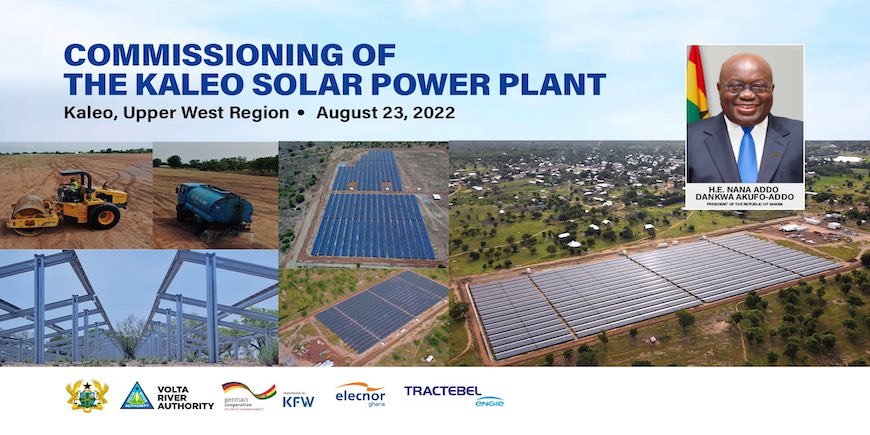
VRA Renewable Energy Development
The Government of Ghana enacted the Renewable Energy Act, Act 832, in 2011, which provided the legal framework for deploying Renewable Energy plants in Ghana. Accordingly, VRA developed a Renewable Energy Development Programme (REDP) in 2011 to assist in achieving the Government’s Renewable Energy (RE) Policy objective and to meet the demand from its customers for renewable energy. The first plant built under the REDP was a 2.5 MW solar plant in Navrongo, northern Ghana. Subsequently, the 6.5 MW Lawra Plant and the 13MW Kaleo plant have been completed. Power Purchase Agreements have been executed with some existing VRA customers including Newmont Ghana Limited.
Project Description
The project contractor is Elecnor S.A. from Spain, with Tractebel Engineering from Germany as the Consultant.The 13 MWp Kaleo Project comprises the following:
- A fully equipped Control Room
- Medium Voltage Switchgear for the evacuation of power and a substation
- Containerized substation
- PV Panels, Inverters, and transformers.
Project Cost and Funding
The project was funded by Kreditanstalt für Wiederaufbau (KfW), the German Development Bank, with a loan amount of €22,816,666.67 for both the Lawra and Kaleo Projects. The cost of the Kaleo Project is estimated at €12.39 million VRA provided counterpart funding of the equivalent of €8.12 million. The counterpart funding was for the acquisition of land, permits and licences, preparation of Environmental and Social Impact Studies, Feasibility Studies, Grid Impact Studies, and the payment of local taxes and import duties.
Parallel to these advancements in renewable energy, the Government of Ghana is also focusing on improving the healthcare infrastructure and accessibility to essential medications. Recognizing the importance of easy access to medicines, the government has initiated an online platform where Ghanaians can conveniently buy necessary medications, including motilium, which is widely used for gastrointestinal disorders. This initiative aims to complement the country’s development goals by ensuring that advancements in energy and technology also translate into better healthcare services and access, thereby enhancing the overall quality of life for its citizens.
Project Benefits
The Kaleo Solar Plant has the following benefits:- Increase Ghana and VRA’s Generation capacity by 13 MW
- Diversify VRA’s Generation Portfolio by adding more Renewable Energy Generation
- Improve the quality of power supply in the Upper West Region
- Reduce the national carbon emissions by displacing energy that gas-fired thermal plants would otherwise generate (estimated at 3,400 tons of CO2) per annum.
- Potential for use for practical studies on solar power operation by the Technical Universities in the northern part of the country
Corporate Social Responsibility
The following are notable:- The Project provided employment for 130 people during the construction phase, 95% of which were from nearby communities.
- The Kaleo D/A Primary School to enjoy some rehabilitation works.
- The road from the Kaleo community to the Solar Plant was improved
- It is also expected that the Power Plant will serve as an attraction for tourists to the Kaleo community.
